
When does a hero know?
The thing they’ve done that made them a hero, well, maybe they know that. Especially after the fact.
But when does a hero know that he or she is in trouble and life has taken a turn in a bad direction? Do they know that today is different, that today I have to pay attention to myself and not to others, that today, maybe, the future comes calling.
A door is an object doing more than opening and closing. A door is a surface and on it a sound can be made.
The sound of the knock.
Today is November 29, 1918. The day after Thanksgiving. The trees surrender the few leaves that are left. The diehards, brown and crumbling, fall to the ground. Empty branches wave in the wind.
The day is also the 85th since influenza knocked on the door from the inside of Fort Devens, Massachusetts and said it’s time—time to get out—time to spread. Back when the leaves were green.
Edna Fletcher is a hero on Day 85. She’s done duty beyond imagining. She heard her boss, the CEO of Methodist Hospital in Indianapolis, Indiana when he said we’ve got to do something to help people here as influenza devours our city while we fight the World War. She stepped forward, said I’ll go, called for volunteers among her student-nurses, and a dozen more said take me. Ahead they went, on a train, into the fury of influenza at Fort Benjamin Harrison, one of the hardest-hit spots of the pandemic in the Midwest. Over the course of a few weeks where they lived a lifetime, she led, they followed, and together they cared for the frightened thousands and the suffering hundreds. Among the dead at the Fort are two of her volunteers. Of Fletcher and her twelve, the truth that can be said is the definition and embodiment of their heroism—they helped.
It is known by the boss back at the hospital. It is understood by the colleagues back at the hospital. It is felt in the life that continues back at the hospital. The woman they call Maw, Edna Fletcher, has done and inspired heroic things.
Yesterday’s Thanksgiving meal at the Nurses’ Home, barely a few hundred yards from Methodist Hospital, was a joy. Wonderful food, warm environment for Fletcher and the student-nurses. The day was rich not just with company but with companionship, not just with guests and visitors but with people sharing a bond of love, commitment, purpose, and gratitude. Yes, yesterday was the holiday celebrated for a lifetime. No truer Thanksgiving was ever held.
Now, today, you walk by the Nurses’ Home. See the windows and walls, the roof and yard. You know how it is, you’re a neighbor. Inside the tables and chairs are back where they were, the food is put away. Edna Fletcher will begin her day like aways, keeping close watch on the young women, those who survived and those who couldn’t quite make the decision to step out and volunteer. Edna Fletcher as their leader will need to spend time on ensuring the group knits itself back together. The chances of resentment and division cannot be ignored. There’s a lot happening at the Nurses’ Home, you’re right to think it. Maw Fletcher is always busy.
The front door is closed. A surface made for sound.
The silent knock.
What does Edna hear? When does a hero know?
Inside. Coughing. Chills. Congestion rapidly worsening. Aches and then more aches, deeper now than a while ago. Weakness and then more weakness, no longer able to stand. Over minutes and into a hour, one power sweeps over and one power falls away.
The trees in the yard are bare.
The signs are unmistakable. The worry is automatic. The experience, as fresh as dirt on the graves and leaves on the ground, is all too vivid, all too clear.
A telephone rings at Methodist Hospital. The boss, Dr. Charles Woods, hears a young voice on the other end of the line. Frantic words, darkened tone. Woods hangs up the black metallic phone.
Maw is sick.

A thought for you on Day 85, June 4, 2020, eighty-five days after President Trump declares Covid-19 a national emergency—the second day. We know that the end of war-fighting in Europe on November 11, 1918 resulted in thousands of Americans leaving their homes and rushing into the streets and plazas. Some wore masks, some didn’t. Regardless, they rushed and touched and stood together to cry, yell, sing, pray, and fifty other things. Then, on a second day, Thanksgiving, they came together again though in a different way. As families and smallish groups of friends, they sat in circles, ovals, rectangles, squares and fifty other configurations to cry, pray, talk, eat, love, and remember. For Maw, the second day must have been the one. Of all days, Thanksgiving. The ten young women who had come back with her from the fort to the city, they now realize that their leader has entered a path of a particular direction. I wonder if we stop time on Day 85 and you have the chance to speak to the ten, what do you want to tell them? And what do you want to say to those who hadn’t gone to the fort? What can you do, with Maw sick, that can help bring the two parts of the group together?
(note to reader—I invite you to subscribe to this series/blog. The purpose of my posting in this series is the purpose of my enterprise at Historical Solutions—to explore the past in a new way that brings new and different value to you, both in the present (this minute) and on the edge of the future (what’s ahead or forward of this minute). The past is everything before now, the totality of all time before the present; history is a set of very small slices of the past that, for a particular reason, have been remembered. If you wish to contact me privately, please do not hesitate to text or call 317-407-3687)







